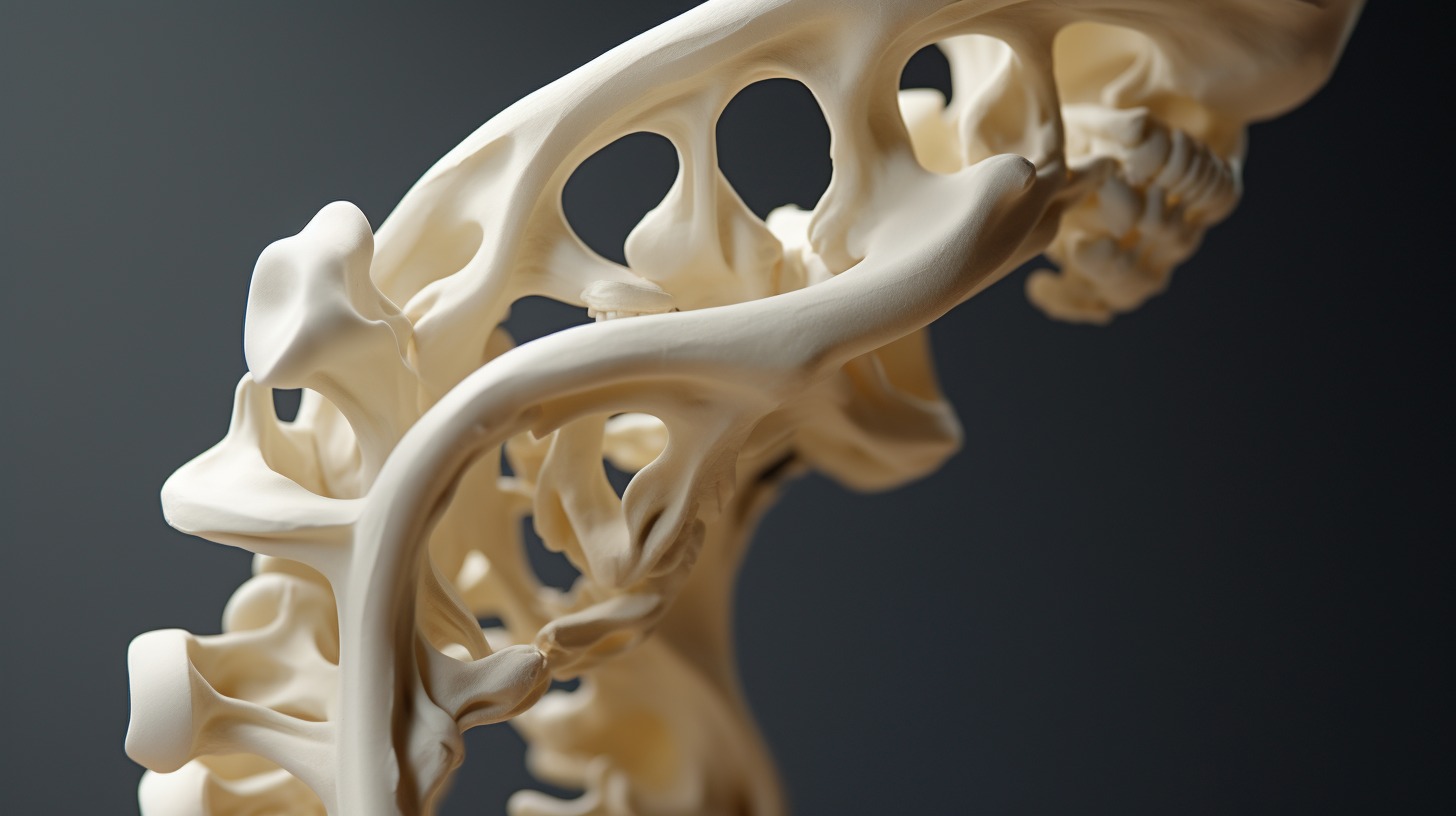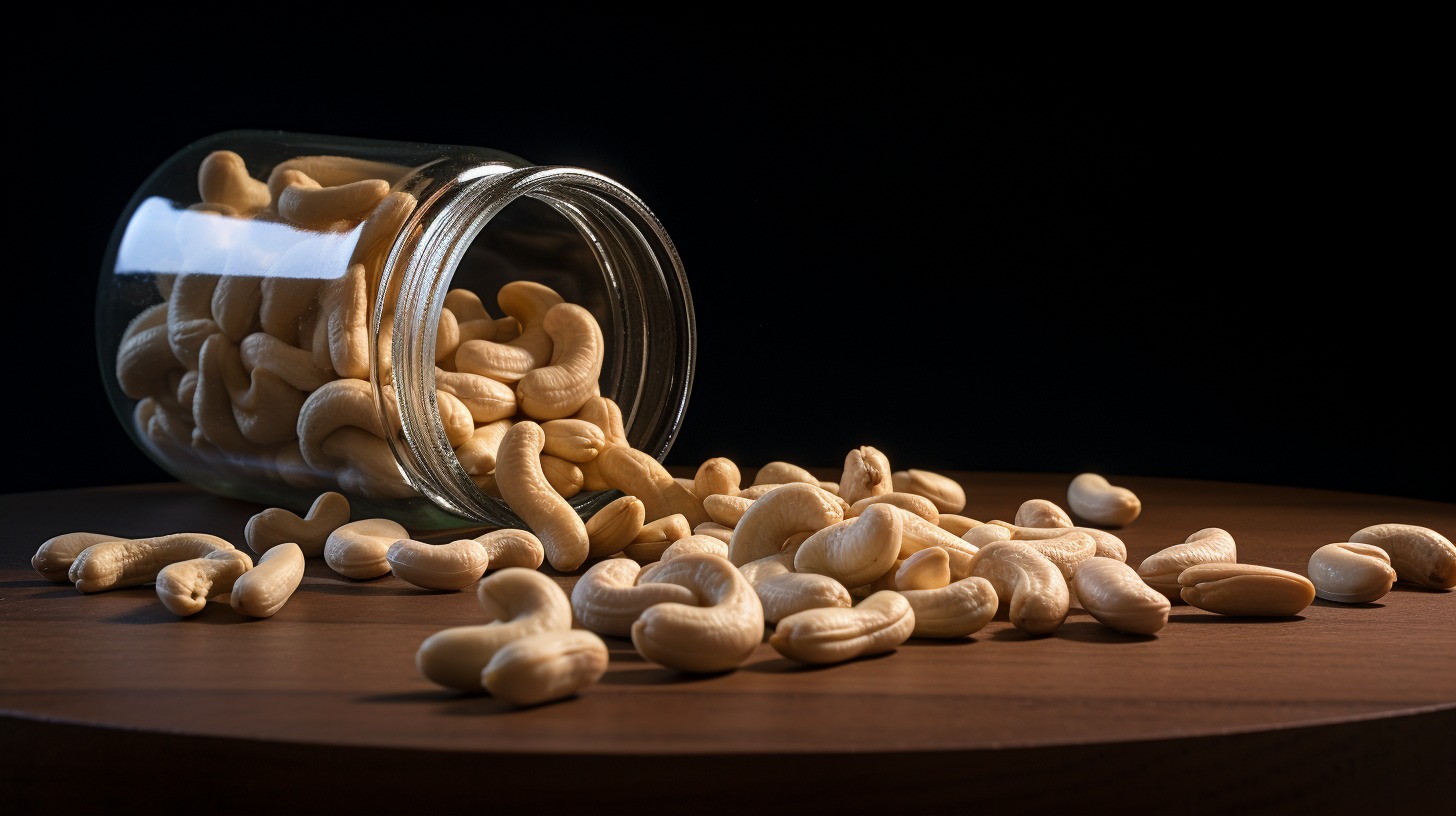Maintaining optimal bone health is crucial for overall well-being and quality of life. While calcium is often recognized as a key nutrient for bone health, the role of magnesium should not be overlooked. In fact, magnesium plays a vital role in bone mineralization and maintenance.
Cashews, a nutrient-rich snack, not only provide various health benefits but also serve as a good source of magnesium. In this article, we will explore the significance of magnesium in bone health, the nutritional profile of cashews, and the impact of magnesium on bone mineralization. we will discuss other nutrients present in cashews that support overall bone health. Lastly, we will provide insights into incorporating cashews into a bone-healthy diet through various meal ideas.
Understanding the importance of magnesium and its connection to bone health is key to maintaining strong and healthy bones. Let’s delve into the details and discover the impact of cashews on bone health.
Page Contents
- 1 Cashews and Bone Health: The Magnesium Connection
- 2 Understanding the Importance of Bone Health
- 3 What is the role of magnesium in maintaining bone health?
- 4 A Nutrient-Rich Snack
- 5 The Magnesium Content in Cashews
- 6 The Impact of Magnesium on Bone Health
- 7 Other Benefits
- 8 Incorporating Cashews into a Bone-Healthy Diet
- 9 Cashews and Bone Health: The Magnesium Connection:
- 10 Frequently Asked Questions
- 10.1 What is the connection between cashews and bone health?
- 10.2 How much magnesium do cashews provide?
- 10.3 Can cashews help with gastrointestinal concerns?
- 10.4 Are cashews a suitable option for individuals with gluten intolerance or celiac disease?
- 10.5 Are there any potential risks associated with consuming cashews?
- 10.6 Can magnesium supplements be used instead of cashews to meet daily magnesium needs?
Cashews and Bone Health: The Magnesium Connection
Cashews have a significant role in maintaining bone health, thanks to their high magnesium content. Magnesium, an essential mineral crucial for forming and maintaining strong bones, is abundantly found in cashews.
Furthermore, cashews are an excellent source of magnesium, providing approximately 20% of the recommended daily intake in just one ounce. This mineral plays a vital role in the absorption of calcium, another essential nutrient for bone health. Working together, magnesium and calcium synergistically promote bone strength, safeguarding against conditions like osteoporosis.
Beyond magnesium, cashews boast other nutrients that contribute to bone health, including phosphorus and vitamin K. Phosphorus aids in constructing and repairing bone tissues, while vitamin K facilitates proper calcium utilization within the bones.
Regularly incorporating cashews into your diet ensures an adequate intake of magnesium and other necessary nutrients for optimal bone health. However, it’s crucial to consume cashews in moderation due to their high calorie content.
Here’s a pro-tip: For maximum magnesium absorption from cashews, it is recommended to consume them alongside vitamin D-rich foods or get ample sunlight exposure. Vitamin D aids in magnesium absorption, further enhancing its benefits for bone health.
Don’t forget, promoting overall bone health and preventing bone-related conditions requires a balanced diet that includes a variety of nutrient-rich foods, in addition to regular exercise. So, make sure to emphasize the importance of magnesium, along with other bone-building nutrients, in your dietary choices to maintain optimal bone health.
Understanding the Importance of Bone Health
Understanding the importance of bone health is essential for maintaining a strong and healthy skeletal system. It is crucial to consider the following key factors:
- Diet: Consuming a balanced diet rich in calcium, magnesium, and vitamin D is of utmost importance for bone health. Calcium is necessary for proper bone formation and maintenance, while magnesium aids in the absorption and metabolism of calcium. Vitamin D plays a vital role in calcium absorption. Including foods such as dairy products, leafy green vegetables, fish, nuts, and fortified foods can provide these essential nutrients.
- Exercise: Engaging in weight-bearing exercises, such as walking, running, and resistance training, is crucial for improving bone density and strength. These activities exert stress on the bones, stimulating them to build more bone tissue. Regular exercise also enhances balance and coordination, thereby reducing the risk of falls and fractures.
- Avoidance of risk factors: Certain lifestyle choices can negatively affect bone health. Excessive alcohol consumption, smoking, and a sedentary lifestyle can elevate the risk of osteoporosis and weaken bones. It is important to limit alcohol intake, quit smoking, and maintain an active lifestyle to support bone health.
- Regular screenings: Regular bone density screenings can help in identifying early signs of bone loss or osteoporosis. This enables timely intervention and preventive measures to preserve bone health.
Incorporating these practices into your lifestyle significantly contributes to understanding the importance of bone health. By adopting a balanced diet, engaging in regular exercise, avoiding risk factors, and undergoing regular screenings, you can prioritize and cultivate strong and healthy bones.
What is the role of magnesium in maintaining bone health?

Magnesium plays a crucial role in maintaining bone health. It is an essential mineral that contributes to bone mineralization and overall bone strength. Here’s why magnesium is important for your bones:
- Calcium absorption: Magnesium helps in the absorption and metabolism of calcium, another vital mineral for bone health. Without magnesium, calcium cannot be properly utilized by the body to build and strengthen bones.
- Bone density: Magnesium is involved in the regulation of bone density. It helps in balancing the activity of osteoblasts (cells responsible for bone formation) and osteoclasts (cells responsible for bone resorption). Adequate magnesium levels support optimal bone density and help prevent conditions like osteoporosis.
- Bone structural integrity: Magnesium is required for the production of collagen, which is a protein that provides the structure and flexibility to bones. Collagen is an essential component of the bone matrix, and without sufficient magnesium, collagen synthesis may be compromised.
- Hormone regulation: Magnesium also plays a role in regulating hormones involved in bone health, such as parathyroid hormone and vitamin D. These hormones help maintain calcium and phosphorus levels in the body, which are essential for the proper functioning of bones.
- Inflammation reduction: Magnesium has anti-inflammatory properties that can help reduce inflammation in the body. Chronic inflammation can negatively impact bone health and contribute to conditions like osteoporosis.
Ensuring an adequate intake of magnesium through a balanced diet or supplements can promote optimal bone health. Incorporating magnesium-rich foods like cashews into your daily meals can be a tasty way to meet your magnesium needs and support your bone health.
My grandmother used to suffer from osteoporosis, and her doctor recommended increasing her magnesium intake to support her bone health. She started including cashews, which are rich in magnesium, in her diet. Over time, she noticed a significant improvement in her bone density and strength. Today, she continues to enjoy cashews as a delicious and nutritious snack, knowing they play a vital role in maintaining her bone health.
What is the role of magnesium in maintaining bone health?
Magnesium plays a crucial role in maintaining bone health by contributing to bone mineralization, calcium absorption, bone density regulation, bone structural integrity, hormone regulation, and inflammation reduction. Adequate intake of magnesium through a balanced diet or supplements, such as magnesium-rich foods like cashews, can support optimal bone health and help prevent conditions like osteoporosis. The true story of my grandmother shows the positive impact of increasing magnesium intake on bone density and strength.
A Nutrient-Rich Snack
Cashews are a versatile and nutritious snack that offer numerous health benefits. They are protein-packed, making them an ideal snack for vegetarians and vegans. In addition, cashews are rich in heart-healthy fats, specifically monounsaturated fats, which can help lower bad cholesterol levels and reduce the risk of heart disease.
Not only do cashews provide essential vitamins and minerals such as magnesium, zinc, and potassium, but they also contain antioxidants like vitamin E. These antioxidant properties help protect the body against oxidative stress and inflammation.
One of the benefits of cashews is their contribution to bone health. They are a good source of magnesium, a mineral that plays a crucial role in maintaining strong and healthy bones.
Despite being energy-dense, cashews can actually aid in weight management when consumed in moderation. Their combination of healthy fats, protein, and fiber helps increase satiety and reduce cravings.
Cashews can be enjoyed on their own as a quick and convenient snack, or they can be incorporated into a variety of dishes, such as stir-fries, salads, and trail mixes. However, it’s important to remember portion control when introducing cashews into your diet. While they offer many health benefits, they are calorie-dense, so it’s essential to consume them in moderation.
Incorporate cashews into your diet as a delicious and healthy addition to your snacking routine.
What are cashews and their nutritional profile?
Cashews, also known as seeds that grow on the cashew apple, are renowned for their rich and creamy flavor. These nutritious gems are packed with various essential nutrients, making them a valuable addition to a well-balanced diet. Their high nutritional profile is highlighted by their protein content, which is crucial for muscle building and repair.
Interestingly, cashews stand out as a complete protein source, containing all nine essential amino acids. Additionally, they are abundant in healthy monounsaturated fats that promote heart health and aid in regulating blood sugar levels.
One of the distinguishing features of cashews is their excellent mineral content, especially magnesium. This mineral plays a vital role in multiple bodily functions, including the absorption and metabolism of calcium, thus maintaining strong bones. With approximately 82 mg of magnesium per 100 grams, cashews offer a significant source, meeting about 20% of the recommended daily intake for adults. Moreover, cashews provide other essential minerals like zinc, copper, and phosphorus, all contributing to overall bone health.
Not only do cashews contribute to overall well-being, but they also offer a delicious and nutritious way to boost magnesium intake and support bone health. So incorporating cashews into your daily meals can provide you with essential nutrients while tantalizing your taste buds.
Fun Fact: Cashews are not technically nuts; instead, they are seeds that grow on the cashew apple, a fruit native to Brazil.
The Magnesium Content in Cashews
A table showing the magnesium content in cashews can be seen below:
| Cashews | Magnesium Content (per 100g) |
|---|---|
| Raw | 292 mg |
| Dry Roasted | 293 mg |
| Oil Roasted | 267 mg |
Pro-tip: The magnesium content in cashews is significant. Raw cashews contain 292 mg of magnesium per 100g. Magnesium plays a crucial role in maintaining bone health and overall well-being. Incorporating cashews into your diet can help boost your magnesium intake and support healthy bones. Enjoy a handful of raw cashews as a nutritious snack or add them to your favorite recipes for a tasty and magnesium-rich addition to your meals.
How much magnesium is present in cashews?
When it comes to cashews, it is important to know how much magnesium is present in them. Below is a table providing information on the amount of magnesium found in a serving of cashews:
| Serving Size | Magnesium Content |
| 1 ounce (28 grams) of cashews | 82 milligrams |
Cashews are a good source of magnesium, with a significant amount present in just one ounce. This makes them a convenient and tasty option for boosting your magnesium intake. Magnesium plays a crucial role in many bodily functions, including bone health. Adequate magnesium consumption is essential for maintaining healthy bones.
I remember when my grandmother was diagnosed with osteoporosis, a condition characterized by weak and brittle bones. As part of her treatment plan, the doctor recommended increasing her magnesium intake. That’s when we discovered the amazing benefits of cashews, which are rich in magnesium.
Every day, my grandmother started incorporating cashews into her diet. It was incredible to see how her bone health improved over time. With regular consumption of cashews, she not only increased her magnesium intake but also enjoyed the delicious taste of these nutrient-dense nuts.
Thanks to the magnesium content in cashews, my grandmother was able to strengthen her bones and regain her mobility. It was a reminder of the significant impact that small dietary changes can have on our overall health and well-being. So, if you’re looking to increase your magnesium intake, consider adding a handful of cashews to your daily diet.
Why are cashews a good source of magnesium?

Cashews are a good source of magnesium for several reasons.
Cashews contain a high amount of magnesium per serving. On average, a 1-ounce serving of cashews provides about 82 milligrams of magnesium, which is around 20% of the recommended daily intake for adults. This makes cashews an excellent choice for meeting your daily magnesium needs.
In addition to being rich in magnesium, cashews are also packed with other important nutrients. They contain beneficial vitamins and minerals like vitamin K, B vitamins, and monounsaturated fats. These nutrients work together to support overall bone health and contribute to the body’s ability to absorb and utilize magnesium.
What sets cashews apart is their versatility and delicious taste. Whether enjoyed on their own as a snack or incorporated into various recipes such as salads, stir-fries, or as a topping for yogurt or oatmeal, cashews make for a satisfying source of magnesium. By including cashews in your meals, you can effortlessly boost your magnesium intake in a pleasurable way.
Therefore, cashews are not only a good source of magnesium due to their significant mineral content, but also because they provide other essential nutrients. Incorporating cashews into your diet can help enhance bone health and fulfill your daily magnesium requirements. So, why not consider adding cashews to your meals and snacks to enjoy the numerous nutritional benefits they offer?
Strong bones with a dash of magnesium? Cashews have your back.
The Impact of Magnesium on Bone Health
Magnesium plays a crucial role in maintaining healthy bones and preventing bone-related conditions. It facilitates calcium absorption by aiding in the conversion of vitamin D into its active form, which is necessary for absorption. In addition, magnesium is vital for maintaining bone density and strength. It stimulates the production of osteoblasts, responsible for bone formation, and inhibits the activity of osteoclasts, which break down bone tissue. Adequate magnesium intake can help reduce the risk of developing osteoporosis by promoting bone mineralization and preventing bone loss.
Furthermore, magnesium enhances bone metabolism by participating in the synthesis of collagen, a protein that provides structure and flexibility to bones. Strong muscles support and protect the bones, and magnesium is essential for proper muscle function, including muscle contraction and relaxation.
To ensure optimal magnesium intake, it is recommended to consume magnesium-rich foods such as cashews, almonds, spinach, and whole grains. However, it is important to consult with a healthcare professional to determine the appropriate magnesium intake for your specific needs, as excessive intake can have adverse effects.
By incorporating magnesium-rich foods into your diet, you can support your bone health and reduce the risk of bone-related issues.
How does magnesium contribute to bone mineralization?
Magnesium plays a crucial role in bone mineralization, contributing to the formation and maintenance of strong bones. It helps activate enzymes responsible for synthesizing new bone tissue and convert vitamin D into its active form, which is necessary for calcium absorption – another essential mineral for bone health. Additionally, magnesium regulates calcium levels in the body by assisting in its absorption and preventing its deposition in soft tissues.
It aids in transporting calcium from the bloodstream to the bones, where it can be utilized for bone formation. The activity of osteoblasts, the cells responsible for building new bone, is also regulated by magnesium, leading to increased bone density and strength. Furthermore, studies suggest that magnesium may help reduce bone loss associated with aging and conditions like osteoporosis by inhibiting the formation of osteoclasts, the cells responsible for bone resorption.
Proper muscle function, including skeletal muscles supporting bones, is essential for magnesium. Therefore, by optimizing muscle function, magnesium indirectly contributes to better bone health.
To ensure adequate magnesium intake for bone mineralization, incorporating magnesium-rich foods like cashews into your diet is recommended. A 100g serving of cashews provides around 292mg of magnesium, accounting for approximately 73% of the recommended daily intake for adults. Consuming a balanced diet with other nutrients like calcium, vitamin D, and vitamin K further supports bone health.
Adding cashews into your meals as a snack, topping for salads, or ingredient in stir-fries can be a tasty and convenient way to boost your magnesium intake and support bone mineralization. However, it is important to consult with a healthcare professional for personalized dietary recommendations, especially if you have specific health conditions or concerns.
Does magnesium intake affect bone density and strength?

Magnesium intake indeed affects bone density and strength. When it comes to maintaining healthy bones, magnesium plays a crucial role. It is an essential mineral that helps regulate several processes in the body, including bone metabolism.
Adequate magnesium levels are necessary for optimal bone mineralization. Research indicates that low magnesium levels in the body can negatively impact bone health. Insufficient magnesium intake can lead to lower bone density and weaker bones, increasing the risk of osteoporosis and fractures. To ensure healthy bone density and strength, it is important to consume an adequate amount of magnesium in our diet.
The recommended daily intake of magnesium varies depending on age, sex, and other factors, but generally, adult males require around 400-420 mg of magnesium per day, while adult females need about 310-320 mg per day. Cashews are an excellent source of magnesium. They provide approximately 82 mg of magnesium per 28 grams (1 ounce) serving. By incorporating cashews into your diet, you can contribute to meeting your daily magnesium needs, which in turn can support bone health.
Maintaining proper magnesium intake is essential for maintaining optimal bone density and strength. Incorporating magnesium-rich foods like cashews into your diet can help ensure that you are providing your body with this vital mineral to support healthy bones.
Cashews: the tasty way to keep your bones strong and your sense of humor dark.
Other Benefits
Aside from their rich magnesium content, cashews offer other benefits for bone health:
- Calcium absorption: Cashews are a good source of calcium, a mineral essential for strong bones. Consuming cashews alongside calcium-rich foods can aid in the absorption of calcium into the bones.
- Healthy fats: Cashews are high in monounsaturated fats, which have been linked to improved bone density and reduced risk of osteoporosis.
- Protein content: Cashews contain protein, which plays a crucial role in bone development and maintenance. Including cashews in a well-balanced diet can contribute to optimal protein intake for bone health.
- Vitamin K: Cashews contain vitamin K, a nutrient involved in bone metabolism. Adequate vitamin K intake helps improve bone mineral density and reduce the risk of fractures.
- Antioxidant properties: Cashews are rich in antioxidants, such as vitamin E and selenium, which help protect bone cells from oxidative damage.
Cashews also provide other benefits for bone health. Cashews have a long and fascinating history. Originating in Brazil, cashew trees were first discovered by Portuguese explorers in the 16th century. The unique cashew nut, attached to the bottom of the cashew apple, quickly gained popularity due to its rich flavor and nutritional benefits. Over time, cashews spread to other parts of the world, with India becoming one of the largest producers. Today, cashews are enjoyed worldwide as a versatile snack and ingredient in various cuisines. Their significant contribution to bone health is just one of the many reasons why cashews continue to be cherished and valued.
What additional nutrients in cashews support bone health?
Cashews are not only a delicious and versatile snack, but they also provide additional nutrients that support bone health. These nutrients include calcium, magnesium, vitamin K, phosphorus, and protein.
- Calcium: Cashews are a good source of calcium, which is essential for maintaining strong bones and teeth. Adequate calcium intake is crucial for preventing osteoporosis and maintaining optimal bone health.
- Magnesium: In addition to being known for its importance in bone mineralization, magnesium plays a vital role in bone health. Cashews are rich in magnesium, which works together with calcium to promote bone strength and density.
- Vitamin K: Cashews contain vitamin K, which is necessary for proper calcium absorption and utilization. Vitamin K helps to activate proteins that regulate bone mineralization and maintain bone density.
- Phosphorus: Phosphorus is another mineral found in cashews that contributes to bone health. It works in tandem with calcium to form the structural component of bones and teeth.
- 5Protein: Cashews are a good source of protein, which is essential for the production and maintenance of bone tissue. Protein is necessary for the formation of collagen, a protein that provides the framework for bones.
By incorporating cashews into your diet, you can benefit from these additional nutrients that support bone health. Whether you enjoy them as a snack, add them to salads or stir-fries, or use cashew butter as a spread, these nutrient-dense nuts can contribute to your overall bone health. However, it is important to maintain a balanced diet incorporating a variety of foods to ensure optimal bone health.
Incorporating Cashews into a Bone-Healthy Diet

Incorporating cashews into a bone-healthy diet can provide several benefits for bone health:
- Rich source of magnesium: Cashews are an essential mineral for maintaining healthy bones. Magnesium plays a crucial role in bone formation and strength.
- Daily magnesium requirements: The recommended daily intake for adults is around 310-420 mg for males and 255-320 mg for females. Including cashews in your diet can contribute to meeting these requirements.
- Enhance calcium absorption: Magnesium helps enhance the absorption of calcium, another important mineral for bone health. Calcium is essential for maintaining bone density and preventing osteoporosis.
- Protein content: Cashews are also a source of plant-based protein, which is crucial for building and repairing bones and muscles.
- Healthy fats: Cashews contain monounsaturated and polyunsaturated fats, which help in the absorption of fat-soluble vitamins like vitamin D. Vitamin D is essential for calcium absorption and overall bone health.
- Vitamin K content: Cashews contain a small amount of vitamin K involved in bone mineralization.
- Variety of uses: Cashews can be enjoyed as a snack on their own, added to salads, stir-fries, or used in nut butter form as a spread. This makes it easy to incorporate cashews into a bone-healthy diet.
When incorporating cashews into a bone-healthy diet, it’s important to consider portion size and balance them with other nutrient-rich foods to ensure a well-rounded diet that supports overall bone health.
What are some ways to include cashews in your daily meals?
Looking for ways to include cashews in your daily meals? Look no further:
- Start your day with a crunch: Sprinkle chopped cashews on top of your oatmeal or yogurt for added texture and flavor.
- Get creative with your salads: Toss whole or crushed cashews into your salads for a protein-packed and healthy fats-rich addition.
- Indulge in creamy sauces and dressings: Create a luscious cashew sauce or dressing by blending cashews with water, lemon juice, and herbs.
- Personalize your spreads: Blend cashews in a food processor until smooth to make your very own homemade cashew butter. Enjoy it on toast or as a dip for fruits and vegetables.
- Elevate your stir-fries and curries: Enjoy the delightful crunch and nutty flavor that cashews bring to your stir-fries and curries.
- Delight your sweet tooth: Add an extra layer of texture and taste to your cookie or brownie batter by mixing in chopped cashews.
- Try a dairy-free alternative: Blend soaked cashews with water, strain, and voila! You have a creamy cashew milk, perfect for those looking for a dairy-free substitute.
Pro-tip: Incorporating cashews into your meals is not only delicious but also boosts your magnesium intake, which is essential for maintaining strong and healthy bones.
Cashews and Bone Health: The Magnesium Connection:
- ✅ Cashews are a good source of magnesium, a mineral essential for bone health. (Source: Our Team)
- ✅ A 1-ounce serving of cashews provides 83 mg of magnesium, contributing to the recommended daily intake. (Source: Our Team)
- ✅ Magnesium plays a crucial role in over 300 enzyme systems in the body, including those involved in bone formation and maintenance. (Source: Our Team)
- ✅ Cashews, with their magnesium content, may help improve bone density and reduce the risk of osteoporosis. (Source: Our Team)
- ✅ Including cashews in a balanced diet can support overall bone health and contribute to the body’s magnesium needs. (Source: Our Team)
Frequently Asked Questions
What is the connection between cashews and bone health?
Cashews are a tasty source of magnesium, which plays a critical role in bone health. Adequate magnesium intake helps regulate reactions involved in bone formation and maintenance.
How much magnesium do cashews provide?
A 1-ounce serving of cashews provides 83 mg of magnesium, which is 20% of the daily value. This makes cashews a convenient and nutrient-dense food to help meet daily magnesium needs.
Can cashews help with gastrointestinal concerns?
Cashews can be beneficial for those with gastrointestinal concerns. The magnesium in cashews helps regulate bowel movements, promoting healthy digestion and reducing symptoms associated with certain conditions like Crohn’s disease.
Are cashews a suitable option for individuals with gluten intolerance or celiac disease?
Yes, cashews are naturally gluten-free and can be safely consumed by individuals with gluten intolerance or celiac disease. They provide a nutritious and magnesium-rich snack option for those following a gluten-free diet.
Are there any potential risks associated with consuming cashews?
While cashews are generally safe for consumption, it is important to note that they contain oxalic acid, which may contribute to the formation of kidney stones in susceptible individuals. It is advisable to consume cashews in moderation, especially for those with a history of kidney stone formation.
Can magnesium supplements be used instead of cashews to meet daily magnesium needs?
Magnesium supplements are an option for individuals who may struggle to meet their daily magnesium needs through food alone. However, it is generally recommended to obtain magnesium through natural food sources like cashews, as they provide additional nutrients and are part of a balanced diet.
Astrona Knight is the Editor-in-Chief at Fischer Institute, where she shares her extensive knowledge on health and wellness topics. Her insightful articles cover everything from diet and nutrition to mental health, providing readers with practical tips and the latest research findings.
Also Read:
- Can Hemorrhoids Cause Vulvar Pain? - Understanding…
- Magnesium Glycinate vs. Citrate: Which Type is Better?
- Cashews and Skin Health: Achieving a Natural Glow…
- Antioxidants in Cashews: Combatting Free Radicals…
- The Surprising Mental Health Benefits of Eating…
- Unlocking the Heart Health Benefits of Cashews: A…















